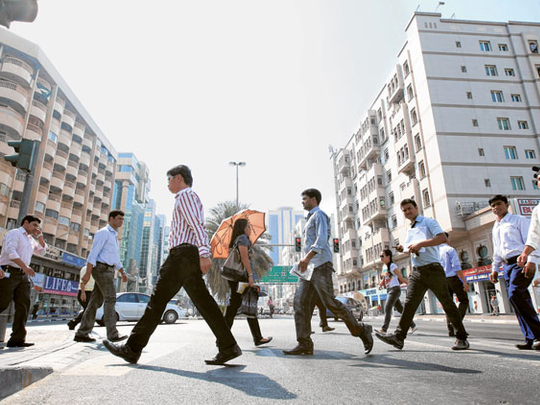
Dubai: The Department of Economic Development (DED) has announced that it is looking to set up a pension scheme tailored specifically for the 1.79 million expatriates living and working in Dubai.
The pension scheme, details of which are still to be announced, aims to encourage employment loyalty and provide a much needed boost in funds to the local asset management industry.
"The study relating to the establishment of a pensions fund for expatriates..is still on the preparatory stages with the DED evaluating the idea, its viability and potential impact. The DED has formed a specialised team to evaluate the idea and will present the findings to the concerned authorities for appropriate action," said Ali Ebrahim, Deputy Director General for Planning and Development, DED.
According to Dr. Mohammad Al Asoomi, a UAE-based economist, having a pension fund in the UAE would be a welcome initiative. "As it is applicable worldwide, pension fund usually contributes in different investments to help grow with the country's economy," he said
End-of-service payout
In the absence of a pension funds, Dubai-based firms are currently required to provide an end-of-service payout to employees, calculated on the length of the employment and basic salary.
"Currently end of service benefits are treated as liabilities on company balance sheets and are not invested with pension benefits in mind. Invested pension funds over the longer term are likely to be inflation protected and provide capital appreciation. Most companies in the UAE have not ring-fenced end of service benefits and this could be a potential risk to employees.
"Overall both employers and employees gain from a pension system as employers no longer need to dedicate time and resources to managing end of service benefits whilst employees enjoy the benefits and advantages of fully fledged institutional money managers looking after their assets and interests," said Saleem Khokhar, head of equities at Asset Management Group.
Fund managers are welcoming this announcement saying the establishment of such a pension scheme would introduce a sustainable stream of long term professionally managed money to the region.
"It's a very timely and needed development which is critical for the development of non-bank financial services. The implications are advantageous on several fronts. It provides a lot more long term and institutional investment in debt and equity markets, helps develop financial markets and it helps limit capital out flows," Mohieddine Kronfol, chief investment officer of Fixed Income/Sukuk for LAM-MENA, told Gulf News.
The extra funds generated by the pension scheme would also help strengthen the local stock exchanges by adding a new dimension and depth different from retail investors.
"Right now we're in serious need of developing financial markets in the UAE and the rest of the Mena region. We still have a lot of restructuring and structural reform taking place, not to mention a fluid political environment. Pension systems support economic growth by adopting long-term investment strategies for which it is well suited and for which banks are not well suited. A pension system is critical for that, said Kronfol.
According to Khokhar, an introduction of a pension scheme would benefit both international and local firms.
"I would imagine that around 15 per cent of assets would be allocated to local markets. The size of the revenue stream would be anticipated to be 5 per cent to 8 per cent of basic salary from the employer and employees also contributing 3 per cent to 5 per cent. Naturally international asset management companies would benefit from the outflow of pension money from the local economy," he said.
Untested
However, according to Mike Hynes, Managing Partner, Kershaw Leonard, an introduction of a pension scheme would be irrelevant in a country where the current residency rules and regulations don't promote long term residency.
"A pension scheme is a long term investment. It does not fit appropriately with the short term residency rules. The pension schemes are all about retirement. Right now there is absolutely no guarantee even if you bought a house that you could retire here. The rules and regulations of buying property are far from clear," said Hynes.
Many expats working in the UAE invest in offshore pension schemes which operate in fiscally neutral offshore locations where high regulatory standards exist.
"If someone is going to take money out of their income and put it in a pension scheme it would be well documented in an offshore place that they can access anywhere in the world. They wouldn't want it pinned down in the UAE in a brand new industry and brand new law where it has never been tested. Most people won't have the confidence to invest in fledgling infrastructure," said Hynes.
The idea to introduce a savings scheme was first introduced in 2008 when the General Authority for Pensions and Social Insurance (GAPSI) proposed a "Pension Savings" draft. After its initial announcement the draft law never materialised.
UAE lacks savings culture
Dubai According to a survey recently conducted by National Bonds, there is no culture of saving for retirement in the UAE. The study shows that nine out of ten UAE residents feel they do not have enough savings to adequately support their future.
From the people surveyed, 71 per cent of people in the UAE do not save regularly and almost half the population saved much less than they planned to last year.
"People are still paying for years of bad habits and misuse of credit cards. It is about a lack of knowledge and how to manage debt. There is a desire to save but people are in distress mode. There is a lot of negative sentiment out there and a lack of know-how in terms of managing expenditure," said Kinan Esmail, executive director of marketing at National Bonds in a previous interview.
Of those who do save, 64 per cent said the amount is usually less than a fifth of their income with 40 per cent of Emiratis and Arab expats saving less than a tenth.
With inputs by Zaher Bitar, Staff Reporter












